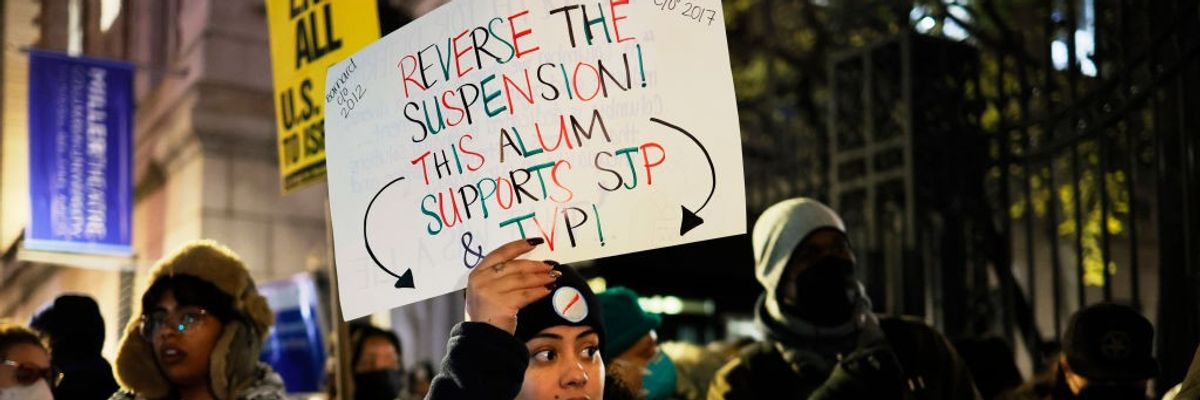The New York Civil Liberties Union and Palestine Legal on Tuesday
filed a lawsuit on behalf of members of two pro-Palestine student groups at Columbia University which avocates say were illegally suspended for engaging in peaceful protests and other events protected under the First Amendment.
The suit—filed on behalf of the Columbia chapters of Students for Justice in Palestine (SJP) and Jewish Voice for Peace (JVP)—seeks the groups' reinstatement. Under pressure from people including wealthy pro-Israel donors, Columbia officials unilaterally
suspended the school's JVP and SJP chapters in November, claiming the groups repeatedly held "unauthorized" events including protests and teach-ins since October 7, when Hamas-led attacks on Israel prompted genocidal retaliation against the people of Gaza.
"Universities should be havens for robust debate, discussion, and learning—not sites of censorship where administrators, donors, and politicians squash political discourse they don't approve of," NYCLU executive director Donna Lieberman said in a
statement.
"These student groups were peacefully speaking out on a critical global conflict, only to have Columbia University ignore their own longstanding, existing rules and abruptly suspend the organizations," Lieberman added. "That's retaliatory, it's targeted, and it flies in the face of the free speech principles that institutes of higher learning should be defending. Students protesting at private colleges still have the right to fair, equal treatment—and we are ready to fight that battle in court."
Maryam Alwan, an organizer with Columbia's SJP chapter, said that "Ivy League institutions should not attract students who value justice and equality if they do not want to be held accountable for the ideals that they claim to uphold."
"As a Palestinian American student, I should have the same right to speak out on my campus as everyone else—and no amount of targeted policy changes or illegitimate suspensions will prevent us from advocating for the Palestinian people," Alwan added.
Cameron Jones, a JVP organizer at the school, argued that "Columbia must protect all Jewish students and voices, not just those adhering to a specific political belief."
"The university's decision to suspend a Jewish group sets a concerning precedent for safeguarding free speech on college campuses," Jones added. "It not only took away our rights as a club, but told us that our university does not support or respect anti-Zionist Jews or their beliefs."
Palestine Legal staff attorney Radhika Sainath noted that "for decades, Columbia students have been at the forefront of speaking out against segregation, war, and apartheid and SJP and JVP sit squarely in this tradition."
"It is precisely because these principled students pose a threat to the status quo that they are being targeted for McCarthyist censorship, but the law does not allow it," Sainath asserted. "Universities must abide by their own rules and may not punish student groups speaking out for Palestinian rights in the moment when they are most essential—even if donors and lobby groups complain."
"For decades, Columbia students have been at the forefront of speaking out against segregation, war, and apartheid and SJP and JVP sit squarely in this tradition."
The Columbia suspensions came amid a nationwide campus crackdown on criticizing Israel or advocating for Palestinian rights. Some students have fought back. In November, the University of Florida SJP chapter
sued state education officials and Republican Gov. Ron DeSantis over their move to deactivate the group over its support for Palestinians' legally enshrined right to resist Israeli occupation, apartheid, and other crimes.
Conversely, five Jewish students and two organizations last month
sued Columbia and Barnard College alleging "particularly severe and pervasive" campus antisemitism, while a Jewish student at Columbia's School of Social Work filed a separate discrimination lawsuit last month.
There has been a dramatic increase in reports acts of both antisemitism and Islamophbia on U.S. campuses and in wider society since October 7.
